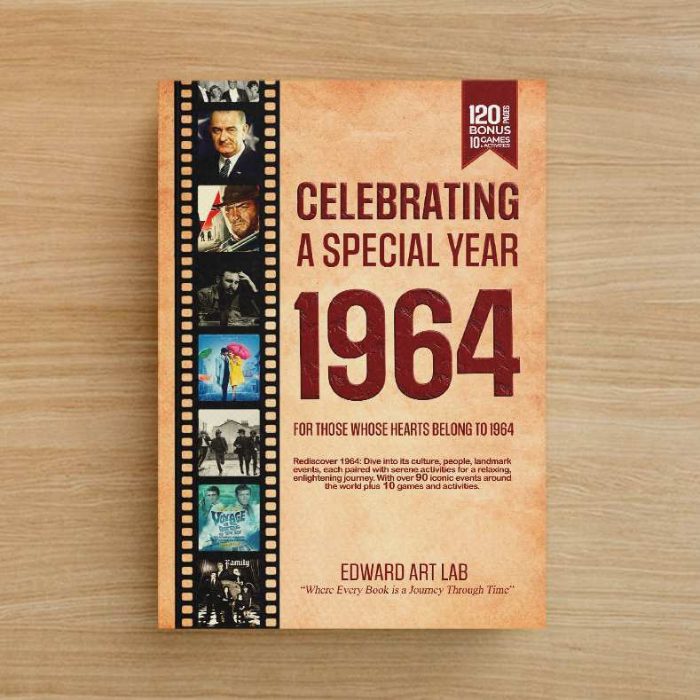The 1990s were an era of transformative cultural, political, and technological change, a decade that resonates with many who cherish its unique flavor of nostalgia. This list presents a collection of books that not only reflect on that iconic decade but also span important years that helped shape the era. Whether you’re looking to relive your favorite moments or simply revisit history through a nostalgic lens, these books offer something special for every 90s enthusiast.
1. Celebrating Special Year 1934 Book

The Celebrating Special Year 1934 Book captures the major events, pop culture moments, and historical significance of the mid-1930s. It sets the stage for understanding the societal shifts that eventually led to the innovations and ideas that dominated the 1990s. Perfect for anyone fascinated by how earlier decades shaped the world we lived in by the 90s.
2. Celebrating Special Year 1939 Book

This book delves into the world at the brink of World War II, providing a stark contrast to the carefree vibe of the 1990s. It’s a reflective look at a year that shaped the trajectory of the 20th century, giving readers a deeper appreciation for the social and political stability that the 1990s inherited.
3. Celebrating Special Year 1944 Book

As World War II was reaching its climax, 1944 brought some of the most pivotal moments in modern history. The Celebrating Special Year 1944 Book offers an insightful look into this critical time, contrasting the hardships of the 40s with the economic prosperity and technological breakthroughs of the 90s.
4. Celebrating Special Year 1949 Book
The post-war world of 1949 laid the groundwork for many of the cultural movements that defined the 1990s. This book provides readers with a window into a transformative year that shaped both the Baby Boom generation and the social dynamics that were at play decades later.
5. Celebrating Special Year 1954 Book

This book captures the rise of television, music, and pop culture, setting the stage for the entertainment boom that would reach its peak in the 1990s. If you’re nostalgic about the 90s pop culture phenomena, you’ll appreciate how this book contextualizes its beginnings in the 1950s.
6. Celebrating A Special Year 1958 Book

In the late 1950s, rock and roll was taking over the world, shaping the music scene that would thrive in the 90s. This book offers a unique glimpse into how music and youth culture began to rebel against the norms, culminating in the rebellious, creative spirit of the 1990s.
7. Celebrating Special Year 1959 Book

As the 1950s came to a close, the seeds of the 90s tech boom were being planted. This book sheds light on a pivotal year when technological advancements began to shape the future, leading to the innovations that defined the digital age in the 90s.
8. Celebrating Special Year 1964 Book

The civil rights movement, Beatlemania, and the counterculture revolution of the 1960s all influenced the ethos of the 1990s. This book reflects on 1964 as a year that helped create the open-mindedness and creativity celebrated in the 90s, from music to politics.
9. Celebrating Special Year 1968 Book

One of the most politically charged years of the 20th century, 1968 was a time of protest, upheaval, and change. The Celebrating Special Year 1968 Book is a compelling read for anyone interested in how the activism of the 1960s carried through to the social consciousness of the 1990s.
10. Celebrating Special Year 1969 Book

With Woodstock and the moon landing, 1969 is often remembered as the end of the 60s and the beginning of modern pop culture. This book gives context to the cultural and technological advancements that would continue to flourish into the 1990s, making it a must-read for 90s nostalgia fans.
11. Celebrating Special Year 1974 Book

The 70s are often credited for introducing trends that peaked in the 90s, like disco and the early seeds of video gaming. This book delves into 1974’s contributions to entertainment, music, and culture, drawing lines between the innovations of the 70s and their full bloom in the 90s.
12. Celebrating Special Year 1979 Book

The late 1970s were marked by a rise in punk music, video game culture, and the emergence of personal computers. The Celebrating Special Year 1979 Book gives readers a look at how these movements influenced the counterculture and digital revolution that defined the 1990s.
13. Celebrating Special Year 1984 Book

Technology and pop culture dominated 1984, a time when personal computers were becoming mainstream and MTV was changing the way people consumed music. This book highlights the beginning of the digital age, which would come to define much of 1990s culture.
14. Celebrating Special Year 1989 Book

The fall of the Berlin Wall and the rise of the internet are two iconic moments that made 1989 a critical year in shaping the world of the 1990s. This book explores how the world changed in 1989 and laid the groundwork for the 90s to become a decade of global change, communication, and connectivity.
Summary
This list of must-read books about key historical years provides a deep dive into the moments that shaped the 1990s. From the cultural revolutions of the 1960s to the technological breakthroughs of the 1980s, these books are a treasure trove for anyone looking to better understand the era they fondly remember.
Internal and External Linking Suggestions








